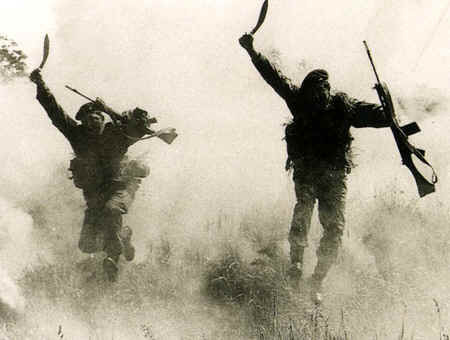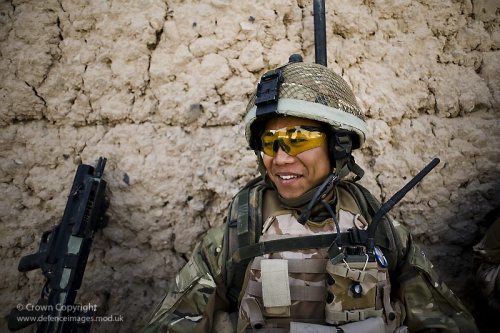miss-andrea: rtrixie: iron-imperialist: amightydirge: The GurkhasA ferocious warrior people from Nep
miss-andrea:rtrixie:iron-imperialist:amightydirge:The GurkhasA ferocious warrior people from Nepal, the Gurkhas (sometimes spelled Gorhka) have a long and illustrious history in warfare. Carrying their distinctive, curved Kukri knives into battle, these men have fought in most every major conflict in the 20th and 21st centuries, all over the world. When the British Empire attempted to subdue Nepal into a colony, the British invasion force was promptly cut to ribbons by the defending Gurkhas. A peace treaty to Nepal followed. The British officers were so impressed with the valor and insane courage of the Gurkhas, that they encouraged Gurkhas to enlist in the British army. Ever since, Gurkhas have served in the British army, technically as mercenaries. Standing at an average of 5’2”, the Gurkha soldiers’ blood is thicker and carries more oxygen, due to the high altitudes the Gurkhas are raised in. They have a preference for close battle, in particular, hand-to-hand combat. For this, they always carry their Kukri knives, which also serves as a handy multi-tool. Gurkhas have a motto, that it is, “Better to die than to be a coward.” They follow this motto seriously, refusing to surrender even in the face of impossible odds. During WWII, Laximan Gurung had his right arm blown clean off by a grenade. Despite the loss of an arm and copious amounts of blood, along with numerous shrapnel wounds, Gurung stabbed his Kukri into the sand in front of him, and declared no enemy would pass it. The last soldier of his picket line, Gurung held off a concentrated assault by over 200 Japanese, quite literally single-handedly. Despite this ferocious attitude, when off the battlefield, the Gurkhas are very, very quiet people, and endearingly shy. They do not like to boast, and are extremely humble. British Officers commanding Gurkhas often remark that they follow orders exactly, are very caring and are “The nicest people you’ll ever meet.” Also, their lamb curry is known for its deliciousness. Until India (and therefore Nepal and the Gurkhas) declared independence, the British fielded ten Gurkha Regiments. After the independence, five of the regiments stayed in India, while the other five continued to serve under the British banner. The British have currently deployed Gurkhas to Afghanistan, as part of the War on Terror. The British military is currently facing severe budget cuts. It speaks volumes about the Gurkhas that, while the British military is willing to retire their Harriers (along with many other hard cuts), the suggestion to disband the Gurkhas was absolutely squashed as an impossible option.Ghurkas are awesome. Also, monarchist factions in Nepal are threatening armed rebellion to restore the Nepalese royal family. If the ghurkas are monarchist-leaning, and I suspect from close ties to Britain they are, then the rebellion will be a glorious thing to watch indeed.Absolutely badass.warrior culture -- source link
Tumblr Blog : amightydirge.tumblr.com


